Just as we need to prepare for the day when we see Jesus face to face at the marriage of the Lamb, those who want to get married someday will want to date someone. A person who will date well will be pursuing personal holiness and praying for some...

Every year I like to set a reading goal for myself to help me stay focused on learning and growing. For three out of the last four years, I have used this guide from Tim Challies, as I have found that the wide variety of categories he offers keeps me reading broadly, forcing me to read things I might otherwise overlook. I encourage you to join me in this challenge as well! No matter how ambitious a reader you are, there's a plan for you (ranging from "light" to "obsessed"). I've set a goal to meet the "committed" level of one book per week, and I'll be sharing short book reviews of each book for those who'd like to follow along with me. If you decide to do the challenge, be sure to let me know about what you're reading, too!
Before I get to the reviews, there are a few things I'd like to point out:
- This post will be updated frequently, with the most recently read books at the top of the page.
- I'm not working through Challies' categories in order, but will be jumping around the list a bit.
- A book's appearing on this list should not be considered an endorsement or recommendation! I intentionally read books representing different ideologies or worldviews, as well as occasionally books containing potentially objectionable material. I approach these books very critically, often with the intent of engaging with someone in a conversation. While I find this kind of reading to be very helpful, it is not necessarily something I would encourage other (particularly younger) readers to do.
- Many of the links in this post are affiliate bookseller links to Amazon, meaning I'll receive a (very) small commission should you happen to purchase the book, but this does not affect the price you pay in any way.

Animal Farm
By George Orwell — A book of your choice (63/52)
Many of us probably read this in middle or high school. Many of us probably hated it then. But it's one that's worth coming back to regularly... and particularly (perhaps tragically?) relevant during our current political climate. People often think of Orwell's other masterpiece, 1984, as being eerily prescient given our culture's current trajectory. And it is, but I think Animal Farm is perhaps more pertinent today because it is satire on what seems to be a current reality, as opposed to a dystopian view of a future that is not nearly so distant as it was when Orwell was writing in the 1940's.
Recommended for: Anyone who hasn't read it recently. (link)
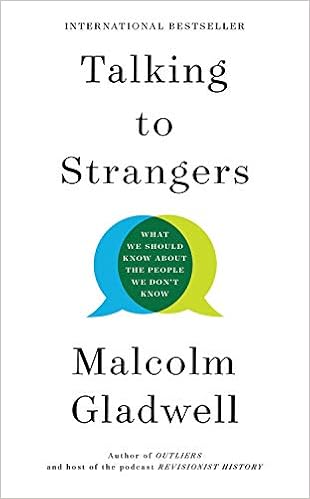
Talking to Strangers: What We Should Know About the People We Don't Know
By Malcolm Gladwell — A book on the current New York Times Bestseller List (62/52)
As a longtime Malcolm Gladwell fan, this lands easily in my top 2-3 of his books. While his writing style is familiar, the content this time was very challenging, and something dear to my heart: how to understand and communicate well with people we don't know well. While Gladwell holds very different religious and political convictions from mine, his insights here are valuable. He digs deep into the circumstances of many prominent news stories from the last decade (e.g. the Sandra Bland arrest and subsequent suicide, the Jerry Sandusky pedophilia scandal, and the Brock Turner rape case), exploring how the media narrative on stories like these almost never tells the whole story, and then moving from the assumptions we make in sensational cases like these to making application to our every day interactions.
Recommended for: Fans of Gladwell's writing, and those looking to be challenged about the assumptions we make about strangers. I also highly recommend the audiobook for this one, as Gladwell formatted it as if it was an extremely long edition of his "Revisionist History" podcast, complete with interviews and audio recordings of materials quoted or referenced in the book. (link)

Tactics: A Game Plan for Discussing Your Christian Convictions
By Gregory Koukl — A book about evangelism (61/52)
An assignment for a seminary class, this was my second time through this book, so it was more of a skim than a full reading, but I was grateful for the refresher. This is a very useful book on the practical/tactical side of evangelism. Koukl presents what he calls the "Ambassador Model" of sharing your faith. He breaks this model down into three main skillset categories: Knowledge, Wisdom, and Character. All three are indispensable for successful evangelism, but this book focuses on the middle of those traits, offering wisdom for how to approach evangelism tactically in every situation. The first half of the book focuses on the "positive" aspects of evangelism; that is, how to have a game plan for sharing your own faith winsomely and persuasively. The second half focuses on the "negative" (in the sense of taking something away, rather than being "bad") aspects of evangelism; that is, finding the flaws in the reasoning of others so that you can redirect them to question their own presuppositions. On the whole, this is one of my go-to recommendations on apologetics for church members.
Recommended for: Those with a zeal for sharing their faith who are looking for a practical book about how to do it better. (link)
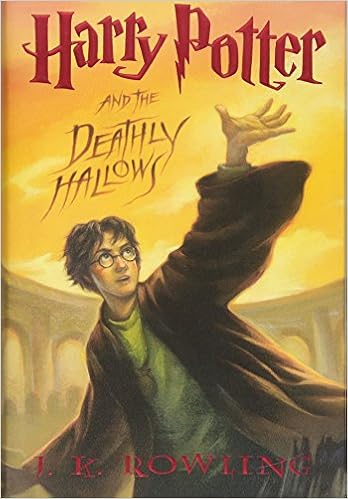
Harry Potter and the Deathly Hallows
By J.K. Rowling — A book by a female author (60/52)
The Gardner family recently finished our read-aloud through the HP books! Every time I read through this series (this was my 5th or 6th time, I think?) I gain more appreciation for the storytelling and character development. I'll admit I was curious how my kids would handle the deaths of some of their favorite characters and the redemption of some of their least favorites, and I was pleased with their responses (though they had some trouble understanding the relationship dynamics between Harry, Ron, and Hermione and their various adventures in dating, being all pre-pubescent themselves). My two older kids are now at various stages of reading the books themselves, though I am very glad we read them together first. It's fun being able to enjoy the same books, something I look forward to sharing over their lifetime as they grow into reading more mature writing.
Recommended for: If you're upset with the ending of Book 6, don't give up! (link)

Lafayette in the Somewhat United States
By Sarah Vowell — A biography (59/52)
Vowell as an author is definitely an acquired taste. Thankfully, I acquired an appreciation of her unique style of quirky, sarcastic nerdiness a few years ago reading her book Assassination Vacation (which focused on the history of every assassination attempt on a US President's life). In this book, she investigates the life of the French aristocrat, the Marquis de Lafayette, who became a hero of the American revolution (and a quick-rapping sidekick of Hamilton). As always, her humor is dark but ever present, as she uses the fascinating story of Lafayette to underlie her greater point that America has, since its inception, been a place where citizens and leaders have been strongly divided by politics, religion, and economics. While I do not share her cynicism about our nation's past or its future, I appreciate her perspective in the stories she tells.
Recommended for: Those who enjoy a unique perspective on history, and who won't be triggered by Vowell's often irreverent view of our nation's past. Warning: If you read the audiobook (as I did), it may prove impossible to not visualize the book being read by Violet Parr, who was voiced by Vowell in both Incredibles movies; perfect casting, by the way, as Sarah Vowell seems to be Violet in many ways. (link)
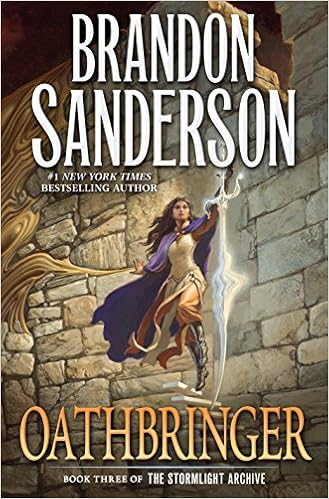
Oathbringer: Book 4 of The Stormlight Archive
By Brandon Sanderson — A book of your choice (58/52)
The good news is I finished this book in time to be ready for the November 17 release of Book 4! The bad news is when I finish that one I'll have to wait a long time for the next entry. But this series keeps getting better and better!
Recommended for: Fans of the Stormlight series. (link)

Interview With the Robot
By Lee Bacon — A book of your choice (57/52)
Sometimes you just need a fun audiobook for when you're out running errands with the kids. This one served that purpose well! It's not great literature by any stretch, though it did provoke some unexpected (but welcome) conversations about ethics and morality. A fun one, and free if you have an Audible subscription.
Recommended for: Passing time in the car with kids. (link)

American Dirt: A Novel
By Jeanine Cummins — A book that is of no particular interest to you (56/52)
I read this book after seeing it recommended by a great many friends, not to mention the fact that it's been one of the best-selling books of the last year (thanks to Oprah's selection of it for her book club). I approached it somewhat skeptically, but also with an open mind to be stretched by it. Cummins' story focuses on the plight of a young mother and her son who, through a set of horrific circumstances, become migrants fleeing from Mexico to America as undocumented immigrants. Obviously this is a very politically-charged topic, and one in which I do not fall comfortably into the political orthodoxy of any political party.
In some ways I really enjoyed the book. The story itself is gripping and well told, fast-paced literally from the first word. Still, many of the story elements seemed contrived, and there was definitely some heavy-handedness in how the reader is presented with certain immigration policy issues (e.g., separation of children from their parents, deportation of long-time US residents, etc), which in a roundabout way made it harder for me to empathize with the very real plight of migrants, particularly those fleeing from cartel violence (which is a huge problem).
I found myself realizing that, while I enjoyed this book in many ways, it was not the book I had hoped it was. I had hoped for a book that would help me see through the eyes of a "typical" migrant, as opposed to this more "sensational" story designed to sell in America. Of course, being largely ignorant on Central & South American life, it's entirely possible that this story is more typical than I believe, though a number of unfavorable reviews from Latinx reviewers seem to underscore my thinking that Cummins seeks to generate sympathy for migrants through a sort of "greater to lesser" argument; that is, by giving us a scenario in which even the most hardened anti-immigrant could feel pity and compassion, the author seems to want us to reason that every undocumented immigrant has such a clear-cut case.
That said, I am grateful to this book, which--despite its flaws--did give me occasion to think more carefully about the problems associated with immigration. And the author did include much of what I was hoping to find through secondary characters and plot lines. Other migrants we meet along the way have a wide variety of stories and motives, and made me wish I knew more of their stories. Cummins doesn't shy away from pointing out the corruption and compassion on both sides of the border, nor from the challenges associated with dangerous people entering our country illegally.
So on the whole, it's a mixed bag, with more good than bad, and I liked the book better than I thought I would. It has definitely whetted my appetite for other books that will help me think more deeply on this issue.
Recommended for: Those who want to read books which are prominent in public dialog, and which may challenge pre-conceived notions. Definitely NOT recommended for young readers, as it is quite graphic in its depiction of cartel violence, rape, and other perils. (link)

Edgedancer: From the Stormlight Archive
By Brandon Sanderson — A book of your choice (55/52)
Sanderson calls this "Book 2.5" of the Stormlight Archive, as he realized one minor character from Words of Radiance needed a bit more back story before gaining prominence in book 3. This short novella focuses on the story of Lift, one of my favorite characters in the series so far. It was a nice stretch of "comic relief" in the midst of an epic, often dark journey through the series proper.
Recommended for: You wouldn't have to read this book on your way through the series, but it's a fun one and definitely worth your time. (link)
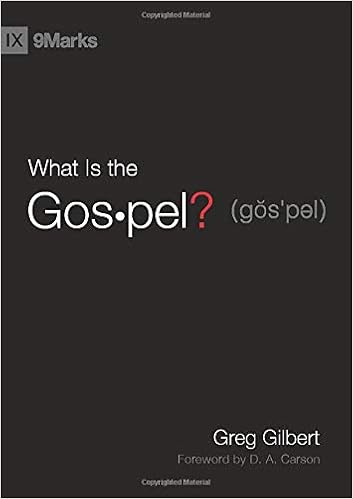
What is the Gospel?
By Greg Gilbert — A book about theology (54/52)
I have read this book many times since it first came out, as it is usually one of the first books I go through with anyone I am discipling. This time, though, it was an assignment for a seminary course on personal evangelism. It's always go to re-read books through a different lens, and I continue to glean more from it each time I read it. Gilbert does an excellent job of answering what is a surprisingly difficult question (we use this word all the time, but have you ever tried to define it?), in a way that is accessible yet weighty. There's a ton of truth packed into a tiny package.
Recommended for: Every believer should read this at least once, and I especially recommend it for people who want to learn more about theology and are wondering, where should I start? (link)

Beholding and Becoming: The Art of Everyday Worship
By Ruth Chou Simons — A book targeted at the opposite gender (53/52)
I bought this one as a gift for my wife, but that doesn't mean I can't read it, too! Ruth Chou Simons website (Gracelaced) is one of Laurie's favorites, and several prints of her paintings hang on the wall of our home. After watching her breakout session at this year's Sing! Conference, I became a fan as well. This book is beautiful in many ways, right down to the texture of the cover! Each chapter is divided into two parts; the first invites us to "behold" an aspect of God's goodness in creation and in his Word, then an encouragement to "become" a better worshiper as we respond to God's revelation. I love her ability to draw out details and beauty from her observations of everyday life, and found this a good reminder to take nothing for granted but in all things to glorify the Savior.
Recommended for: I think anyone could enjoy this, but it is definitely geared more toward domestic life, with women in view. (link)
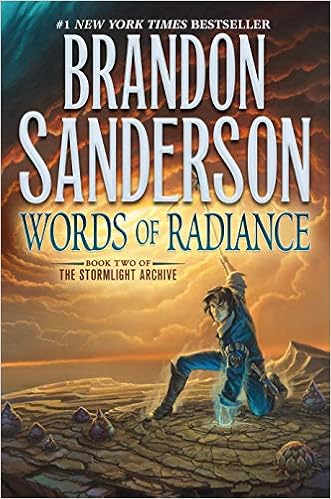
Words of Radiance: Book 2 of the Stormlight Archive
By Brandon Sanderson — A book of your choice (52/52)
Unlike book #1 in this series, this one didn't take any time at all to get into, as the action is pretty constant from the get-go. I'm very much enjoying this series!
Recommended for: Those who love high fantasy. Start with book 1, though... see below. (link)

What's Your Worldview?: An Interactive Approach to Life's Big Questions
By James N. Anderson — A book written in the 21st century (51/52)
This was a unique one! It's formatted like one of those old "choose your own adventure" books, only with philosophical questions. As you read, there are a few paragraphs which highlight one of "life's big questions." How you answer determines where you go next. Through a series of questions, you eventually arrive at a worldview, along with the philosophical implications of what you say you believe, and an option to reconsider your answer. It's a novel approach to worldview and apologetics, written at a very approachable level.
Recommended for: I can see this working really well for students, or those who are not believers but genuinely searching for answers. Either way, I'd recommend it primarily as a book for a seasoned believer to read with someone, rather than something you'd hand out and expect someone to find their own way. (link)

Rage
By Bob Woodward — A book with a person on the cover (50/52)
Bob Woodward's ability to get important people to talk about stuff they probably shouldn't is legendary. And so the fact that Trump not only allowed but requested this book be written--in an election year--and then said on the record all the stuff he said (by now you've probably heard the tapes) ought to be astonishing, but actually isn't. What else would we expect from the guy who bragged he could commit murder on 5th Avenue and not lose voters? That said, Woodward once again presents a fascinating, up close look inside the administration of a sitting President. While he does editorialize quite a bit in his writing--and once again concludes that Trump is unfit for the presidency, as he did in his 2019 book Fear--his opinions did not strike me as particularly partisan. He is known for his critiques of members of all political parties, and conservatives such as Mike Pence and Dan Coats are portrayed quite sympathetically in this book.
Trump is nothing if not a polarizing leader who refuses to play by anyone else's rules. His brash style has made his presidency both consequential and memorable (he wouldn't want it any other way!), for better or for worse, depending on your perspective. In displaying both the loyalty Trump commands and the vitriol he inspires, Woodward shows that his book is aptly named; "rage" does seem to be a dominant theme in contemporary political discourse, both among Trump's supporters and his detractors. It's also the word Trump himself used to describe what he most brings out in people, during his first interview with Woodward in early 2016, shortly after announcing his candidacy.
This book won't go down as the definitive book on Trump's presidency, and it's extraordinarily unlikely that it is going to change anyone's vote this November. But to date I don't think anyone has presented Trump in his own words--outside of Trump's own Twitter feed--nearly to the extent that Woodward does. For that alone, it's worth reading, though it must be read critically.
Recommended for: Politics junkies who enjoy insider accounts and can stomach prodigious use of the "f-word"... parents, don't listen to the audiobook with kids around! (link)

Teaching the Faith, Forming the Faithful: A Biblical Vision for Education in the Church
By Gary A. Parrett and S. Steve Kang — A book about Christian living (49/52)
The final and most academic of the books I read for a seminary course on Christian Teaching, this is a good and extremely comprehensive manual for developing the teaching ministry of a church. While few will want (or need) to read it cover to cover, it is a great reference volume for any pastor's library.
Recommended for: Seminary students, Christian school leaders, and pastors thinking through the teaching ministry of their church. (link)
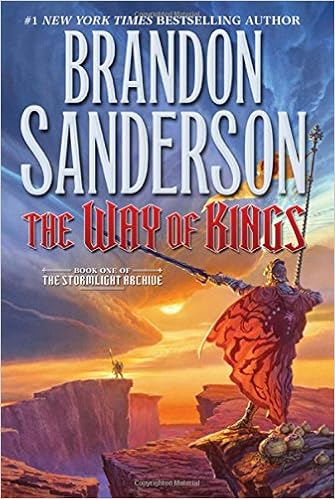
The Way of Kings: Book 1 of the Stormlight Archive
By Brandon Sanderson — A novel by an author you have never read before (48/52)
This is a book I've been hearing about for a while now and finally got around to reading. I happen to enjoy books in the high fantasy genre (think Tolkien's Lord of the Rings,Alexander's Chronicles of Prydain, or Rothfuss' Kingkiller Chronicles), but this is a story that I think could be enjoyed by those who don't consider themselves fantasy fans. As is common in epic stories (again, LOTR comes to mind), it's a bit of a slow burn in the beginning as characters are introduced and the world is being described, but even here the storytelling is very well done. And once the action takes off, it's pretty thrilling! I particularly appreciate Sanderson's ability to tell his story without the need for vulgar language; having slogged through George R.R. Martin's A Song of Ice and Fire series recently, this is a very welcome relief... and a better story, too! The fourth book in this series (which is anticipated to be a 10-volume epic) will be released this November. At just over 1000 pages, the first book is the shortest so far, so if you check this one out, prepare to be immersed for a while!
Recommended for: Those who enjoy high fantasy, or are looking for an excellent introduction to the genre. (link)
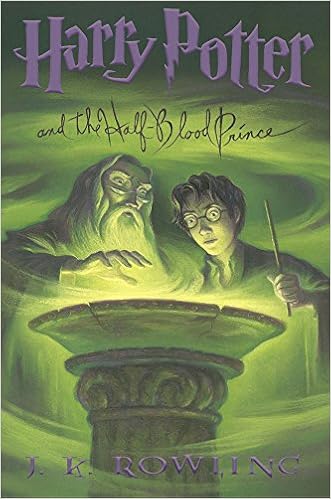
Harry Potter and the Half-Blood Prince
By J.K. Rowling — A book published in hard cover (47/52)
Our family's read-aloud through the HP books is nearing its end! I wasn't sure how my kids would handle the big ending, so that was fun. Also, Nate is not a fan of snogging.
Recommended for: If you don't know by now whether you are into Harry Potter, don't start here. (link)

Philosophy & Education: And Introduction in Christian Perspective
By George R. Knight — A book by an author you've never heard of (46/52)
Philosophy and education are two of my favorite areas of study, so a book combining the two sounded pretty good to me when it was assigned in a recent seminary class. Personally, I loved it, though your mileage may vary. Knight does a good job explaining terms and building a case for why the formal study of philosophy should be a prerequisite for anyone tasked with teaching in any Christian setting, so it's more accessible than many books of formal philosophy. The part I found most helpful were the chapters which traced the development of thought across various teaching philosophies throughout history. It's useful to see how different ideological foundations result in different practices in our teaching, and to be able to work backward from some of the crazy stuff we see happening in schools today (compulsory sex ed for Kindergarteners, anyone?) to the core convictions which lead people to react so strongly for and against different methodologies and curricula.
Recommended for: Christian teachers of all kinds, as well as pastors responsible for the discipleship of their congregation. (link)

Hamilton: The Revolution
By Lin-Manuel Miranda and Jeremy McCarter — A book about art or an artist (45/52)
The arrival of Hamilton: The Musical on Disney+ was enough to get me to take the plunge to subscribe. I'd listened to the soundtrack several times and had always wanted to see the show that everyone's been talking about for the last five years. It did not disappoint! I'm an unabashed fan of musical theatre, and this show absolutely lives up to the hype. Miranda is a certifiable genius, and this show is a masterpiece of modern art. I had actually read part of this book (written as a sort of "tell-all" about the show) about two years ago on my first plane ride to Spokane, when the lady in the seat next to me couldn't stop telling me how awesome it was. Having seen the show, I thoroughly enjoyed reading all about its origin, development, and production, and then watching the show again while following along with Miranda's annotated lyrics.
Recommended for: Fans of Hamilton, lovers of good art, and appreciators geniuses (link)

Teaching to Change Lives
By Dr. Howard Hendricks — A book by an author who is now deceased (44/52)
This book was assigned for one of my seminary classes, but I had actually read it about ten years ago when I was serving on the board of directors for a classical Christian school. It was good then, and is still really good now! Hendricks offers up seven "laws" which will help make teaching--and particularly Christian teaching--more effective at producing the type of changed lives which result in students growing more like Christ. It's very accessible, and super practical.
Recommended for: Anyone who teaches, but particularly those teaching in a classroom setting (including in the homeschool classroom). (link)

The Third Lynx
By Timothy Zahn — A book of your choice (43/52)
Before I finished Night Train to Rigel earlier this summer (see book #37 below), I placed a hold at the library for the second book in the series. It was okay, I guess, but not good enough to make me want to read the rest of the series.
Recommended for: Die hard Sci-Fi fans who need something easy to read. (link)
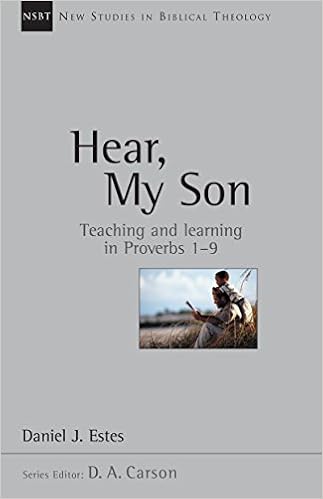
Hear, My Son: Teaching Learning in Proverbs 1-9
By Daniel J. Estes — A commentary on a book of the Bible (42/52)
I know I shouldn't say this as a pastor but... I don't always enjoy reading commentaries. Technically, this isn't a commentary, but rather a book on biblical theology studying topics in Proverbs. However you classify it, it was really, really good. I'm getting ready to help lead families in our church through a study of Proverbs, and this has been super helpful. Estes focuses on the biblical worldview underlying the book of Proverbs, and on principles we about teaching which we can learn from its first 9 chapters. He interacts with teaching methodologies which are much more prevalent in secular (and many Christian) teaching settings, and demonstrates why a biblical worldview is a necessary foundation for understanding the world around us.
Recommended for: Teachers, pastors, and those who disciple others (link)
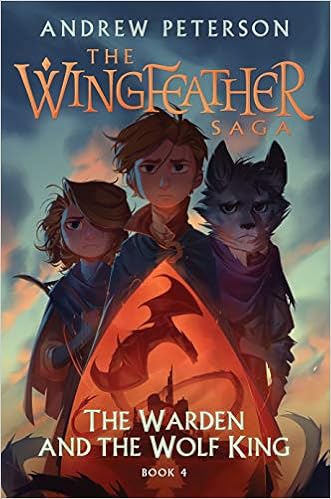
The Warden and the Wolf King
By Andrew Peterson — A novel longer than 400 pages (41/52)
Peterson's final book is the best in the series, and it's not even close. When we finished it as a family read-aloud last night, my wife mentioned that this is now one of her favorite books of all time, and it's hard to argue with that! It's a tear-jerker for sure, as Peterson has become a master of effective emotional engagement, and it's just a joy to read. I've said it three times already in this list, but I really mean it... go read this series!
Recommended for: Everyone! (link)

On Christian Teaching
By Saint Augustine — A book more than 150 years old (40/52)
Technically, we could add another digit to this book's category requirement, as it is well over 1500 years old! In the past I've read Augustine's City of God and Confessions (several times), but only recently discovered that he had a third extant book, which throughout church history has actually been his most influential. Who knew?! (Apparently, tons of people.) Anyway, it's divided into four parts, with the 4th being easily the best and most useful, as it focus on rhetoric and how to winsomely and persuasively present an argument. Still a bestseller after 16 centuries as history has not produced anyone to match Augustine's charm, wit, and intellect. So glad I read this!
Recommended for: Anyone who teaches (or desires to teach) or wants to improve his or her ability to persuade. (link)

Harry Potter and the Order of the Phoenix
By J.K. Rowling — A book of your choice (39/52)
We're well past the halfway mark in the first reading of the HP series with my kids. I won't tell you how many times I've read the series as I desire your respect as a pastor. But this is one of my favorites in the series as it develops so many characters so well.
Recommended for: At this point you're either reading and enjoying the series, or you're not! (link)

Instruments in the Redeemer's Hands: People in Need of Change Helping People in Need of Change
By Paul David Tripp — A book about Christian living (38/52)
I love this book's emphasis on the fact that, as believers, we need each other deeply! God has called us to faithfulness and righteousness, but he has called us to do this in community. None of us is capable of navigating life's challenges on our own, and Tripp has provided yet another excellent resource for helping one another find true and lasting change at the heart level. The book equips readers both philosophically and practically to root out "the functional rulers of the heart" which lead us into sin, and instead focus on how Christ dethrones these rival rulers. Most helpful to me were some of the appendices, which outline a specific manner of questioning for use in a counseling situation (whether formal or informal) to quickly get to the heart of the issue.
Recommended for: Pastors, small group leaders, biblical counselors, and parents. Anyone to whom other folks are responsible or come for help. (link)
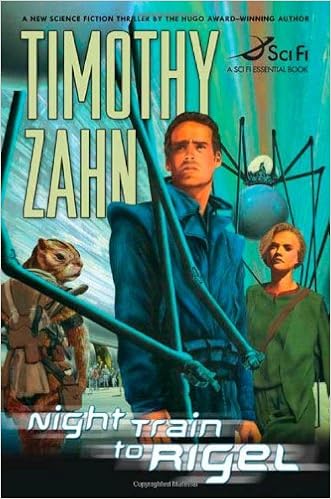
Night Train to Rigel
By Timothy Zahn — A book of your choice (37/52)
I recently watched (despite many warnings not to) The Rise of Skywalker. It was (as I had been warned) pretty terrible, which got me thinking again about how much I wish the JJ Abrams trilogy had not replaced the infinitely superior "extended universe" of the 90's era Star Wars books, most notably the Thrawn Trilogy by Timothy Zahn. That story and those characters were so much better than what we got in the latest movies! So anyway, that got me thinking, 'what else has Timothy Zahn written?' Which brought me to the Quadrail Series, of which this book is the first. I can't say I'm going to love it in the same way I loved Zahn's Star Wars books, but this one was pretty okay. We'll see where the rest of the series goes.
Recommended for: Sci-Fi fans looking for a series by a guy who's proven he can write an awesome series. (link)

Heroes: The Greek Myths Reimagined
By Stephen Fry — A book by or about a celebrity (36/52)
Another book which is the continuation of a series mentioned below, this is the second (of a planned three) book in Stephen Fry's creative retelling of Greek mythology. Like Mythos (see below), Heroes is a very readable and humorous introduction to these classic tales, this time focusing on heroes such as Herocles (you probably know him better by his Latin name, "Hercules"), Perseus, Jason, and more. If you want scholarship and fidelity to the original texts, there are plenty of other, better options out there. If you want something that's just a fun read that provides a basic overview of the stories (with copious use of creative license), this series definitely delivers. I did like the first book better, though.
Recommended for: Those who enjoy Greek mythology, or just a good story. Save caveats apply as to the earlier book, however. (link)

Stranger Planet
By Nathan W. Pyle — A book that seems like it will make you laugh (35/52)
Okay, so "seems" is a bit inaccurate. After reading Pyle's first book (see Strange Planet below), I "knew" this book would make me laugh! I seriously love these comics, and pre-ordered this one months before its release. Our whole family frequently picks up one or the other of these books, and it's a joy to watch my children being corrupted by my love of wit, language, and sarcasm.
Recommended for: People who laugh (link)

Neighboring Faiths: A Christian Introduction to World Religions
By Winfried Corduan — A book by or about a missionary (34/52)
This is a seminary textbook, but is very accessible for laymen as well. I love reading about other world cultures and religions, and a summer under quarantine gave me the opportunity to dig quite a bit deeper into some of the more ubiquitous faiths (Islam, Hinduism, Buddhism, etc) while also being introduced to some religions about which I had read nothing previously (Jainism, Sikhism, animistic tribal religions, etc). Corduan is both thorough and fair, striving to accurately represent the tenets of these faiths in a way which will give Christians greater understanding of our neighbors, as well as strategies to build relationships with them and ultimately share the gospel of Jesus Christ with every nation, tribe, people, and tongue.
Recommended for: Few will want to read this cover-to-cover, but it would be an excellent resource book in the library of any Christian with a heart for reaching the nations, or those with questions about reaching neighbors of a differing faith. (link)
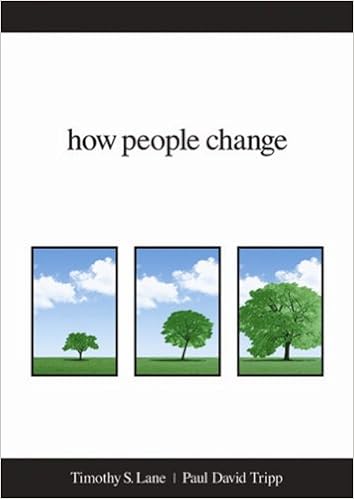
How People Change
By Timothy S. Lane & Paul David Tripp — A book by or about a pastor or pastoring (33/52)
This book focuses on what the authors call "the gospel gap," which is one of the main reasons why biblical counseling exists. All Christians profess a belief that, through God's grace, our sins have been dealt with on the cross, and we place our hope in the promise that we will one day share an eternity with Christ, free from sin and the curse. But there is a gap which exists between those two glorious truths, in which believers often struggle to see the blessings and power which this same gospel provides for us as we face the trials and temptations of our present lives. Lane & Tripp provide a very helpful metaphor (known as "Heat, Thorns, Cross, Fruit) for demonstrating how a proper understanding of the gospel leads to the freedom to which we are called to live in the here and now. It was extraordinarily helpful and hopeful, and very needed in our present circumstances when so many folks are in need of wise biblical counsel.
Recommended for: Pastors, those interested in becoming biblical counselors, and believers looking for hope for themselves or others in overcoming sinful responses to trials and temptations. (link)

Nut Jobs: Cracking California's Strangest $10 Million Dollar Heist
By Marc Fennell — A book by someone from a different continent than you (32/52)
Marc Fennell is an Australian journalist who investigates food-related interest stories, and narrates audiobooks (technical released as a short podcast series) with his findings. Last year I read and thoroughly enjoyed his study of "the scandal-plagued race to breed the world's hottest chili," so when he released a new book about millions of dollars of nuts being stolen (by the Armenian mob, apparently), I thought it would be worth checking out. And I wasn't disappointed! While shedding light on a fascinating modern caper in which more than ten million dollars worth of almonds, pistachios, walnuts, and other nuts vanished without a trace from California's central valley, his journey ranged from the mafia's roots in agri-crime to corruption in food-related academic research to ethical questions related to the ethics of modern farming and employment practices. And while I don't share his political or philosophical worldview (which becomes quite apparent), I do appreciate the way he often challenges me to rethink some of my own positions, though I generally find his conclusions to be uncompelling.
Recommended for: Nut lovers, foodies, and those who enjoy a good crime tale. Be forewarned: There is some very uncouth language used at times, and a decidedly leftward slant to the conclusions he draws, which may be a turnoff to some. (link)

The Monster in the Hollows
By Andrew Peterson — A book you have read before (31/52)
Book 3 in the Wingfeather Saga is where improvements in Peterson's writing and storytelling really begin to be evident. The entire series is great, but this is the book that really roped me in to the "saga." The characters become much more three-dimensional, flaws and all. In fact, it's the flaws that make it such a great book to read with the kids, as they are able to relate to the struggles with sin which the Wingfeather children (and others in the books) experience. I can't wait to finish the series again soon!
Recommended for: Everyone! (link)

The Bassoon King: My Life in Art, Faith, and Idiocy
By Rainn Wilson — A memoir or autobiography (30/52)
Rainn Wilson has been something of a fascination for me for some time. Not only has he given life to one of the best characters in television history (Dwight Schrute from The Office), but he's been a very outspoken advocate for exploring "life's big questions," through his Twitter feed, a very influential video introduction to the Baha'i faith, and his website Soul Pancake. He's also a lapsed bassoonist. As I'm taking a summer class on World Religions right now at SBTS, this seemed as good a time as any to check out Wilson's memoir. It is at times hilarious, raunchy, introspective, and--as someone fully committed to the exclusivity of the gospel--terribly sad. He is nothing if not a true devotee of this modern (founded in the 19th century) religion, and has invested his considerable gifting and notoriety spreading its message, which, while on the surface seems to offer a hopeful and optimistic view of the world, ultimately fails to compellingly answer any of life's biggest questions (such as the "problem of evil"). As a spokesman for Baha'i, he is eloquent and winsome, but in the final analysis wraps an ugly present in pretty paper. Still, it was a worthwhile and enjoyable read.
Recommended for: Fans of The Office and/or those interested in learning about the Ba'Hai faith from one of its most dedicated adherents. (link)

Mythos: The Greek Myths Reimagined
By Stephen Fry — A book about an interest of yours (29/52)
Since I was a little boy, I've been fascinated by stories of myth & legend. From storybooks as a kid, to modern retellings as a teen, to classical study and original sources as an adult, to beginning the cycle again with my own children, Greek mythology has become a very familiar companion in my reading life. So when I stumbled across actor/comedian Stephen Fry's new retelling I was curious to see what he'd done with them. Having read many of the original sources, I am skeptical of most modern versions, as many seem to censor (or "bowdlerize", as Fry says in his book) material modern audiences may find offensive, and/or present the stories with some sort of modern political/moral agenda. In both of those areas, Mythos does better than most modern versions with which I am familiar. Fry certainly does not shy away from the gory or lewd elements of the ancient stories (though at times he perhaps even over-accentuates them, if that is possible), and, though his atheism and religious skepticism is quite apparent in his editorializing in the introduction and epilogue, he does seem to present the stories themselves relatively free from modern biases, for which I was grateful. That said, he does take quite a bit of artistic license in his "retelling" of many stories, at times fabricating fairly large plot elements to add dramatic flair--most notably in his telling of the story of Prometheus' creation of the first mortal men. He excuses such license as being in the tradition of Ovid and other classical and modern authors who have embraced the fictitious nature of the stories and made them their own. Whether or not one agrees with him, he is nothing if not thorough in covering the oldest Greek myths (from Creation through the Titans to the birth of the gods and the Titanomachy to the establishment of the Olympians and the beginnings of human civilization). At 352 pages (its followup Heroes, which covers later Greek mythology and is on my reading list for later this year is even longer) it may appear intimidating, but is actually quite easy and enjoyable to read, and worth checking out for the etymological highlights alone.
Recommended for: While I am still partial to the classical authors, those looking for a readable, entertaining version of Greek mythology will enjoy this. It is NOT recommended for reading to kids! (link)

The Death of Expertise: The Campaign Against Established Knowledge and Why It Matters
By Tom Nichols — A book about science (28/52)
Why is it so hard to have a civil conversation about anything of substance these days? Why does everyone seem to have such strong opinions about everything, and why do we find it so hard to trust what we see on the news? The Death of Expertise takes on these questions and many more, and given the current state of the world, may end up being the most important book I'll read all year. Nichols offers great insight--with acerbic wit--into the breakdown of trust between laypeople and experts. Capitalism, he rightly argues, relies on specialization and diversification of skills. And, bitter pill though it may be for some to swallow, some people are smarter than others (this is consistent with the acknowledgement that there are many kinds of "smarts"). However, lately it seems that everyone feels that his/her opinion is equally valid as anyone else's, regardless of experience or expertise in the matter. Nichols examines multiple reasons for this, from breakdowns in the education system, to the ubiquity of Internet data, to special interests in the mainstream media, to public and epic failures of actual experts. His writing is compelling and well reasoned, and useful for understanding the world around us. Thankfully, he does offer hope... though the path to bring the general public out of the depths of willful ignorance seems to get steeper and steeper by the day. This is likely to be a book I will read many times in the coming years.
Recommended for: Anyone interested in civil discourse and genuine learning, and those wondering how the breakdown of those things got to the point that it has. (link)

Strange Planet
By Nathan W. Pyle — A book of comics (27/52)
Nothing has made our family laugh more than this book in a very long time! I've long enjoyed Pyle's comics through his social media presence, but it's so much better in print (not to mention the fact that many of the comics in the book are not available online). I love the way Pyle shows us, through the beings he has created, the absurdity of many of our every day rituals. The ability to laugh at ourselves through the common experience of simply being human is a joy, and something from which I think we could all benefit right now.
Recommended for: Absolutely everyone. Except fuddy-duddies. (link)
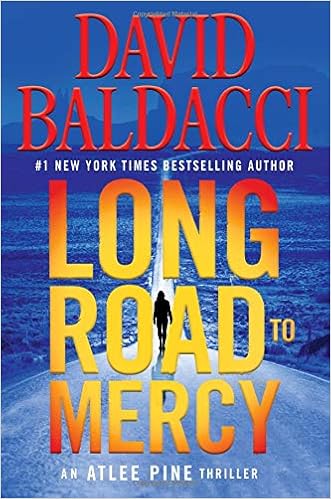
The Long Road to Mercy
By David Baldacci — A book about America or set in America (26/52)
A couple years ago I began reading some of Baldacci's books when he appeared on the "favorite authors" lists of Barack Obama and George W. Bush in the same year. I, too, now consider him a favorite author, though I have enjoyed some series more than others (the "Camel Club" and "Amos Decker" series in particular). This is the first book of his "Atlee Pine" series, which follows an FBI agent stationed near the Grand Canyon. So far this is shaping up to be another series I'll enjoy!
Recommended for: Those who enjoy thrillers and/or detective stories. (link)

North! Or Be Eaten
By Andrew Peterson — A book that looks easy to read (25/52)
I already sang the praises of The Wingfeather Saga earlier (see book 19 below) so I won't say too much more here, other than that our family is already missing the nightly read aloud which Peterson did for Books 1 & 2 on his social media accounts. Lucky for us, he also recorded the audiobooks for Books 3 & 4, so we're going to start working through those as a family very soon (Carrie has already read ahead and finished the entire series because she just couldn't stand only reading a couple chapters a night).
Recommended for: Anybody who has finished the first book? (link)
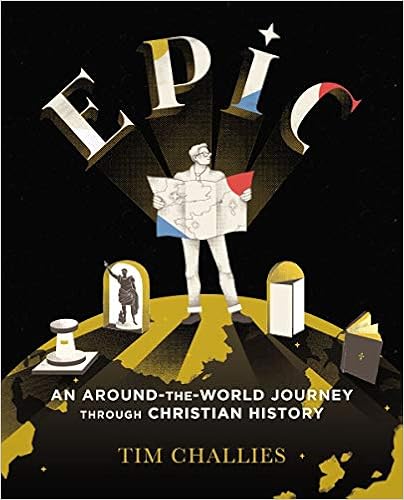
Epic: An Around-the-World Journey Through Christian History
By Tim Challies — A book about church history (24/52)
I love reading about church history, and this book was certainly a unique addition to the genre. Rather than focusing on people, places, or events, Epic focuses on artifacts which are accessible to the general public today, which help tell the story of Christian history. Thanks to the donations of a wealthy benefactor, Challies was able to travel the world for a year visiting museums, cathedrals, and other places holding interest artifacts (some well-known, others quite obscure). Each of the 33 short chapters (with a few additional artifacts receiving shorter treatment) explains the significance of one of these items, arranged in a way that progresses from the earliest days of the Church until today. While it is by no means the best book on my library's church history shelf, it did introduce me to some stories I'd never heard before, and Laurie and I quite enjoyed it (along with the accompanying DVD)

John is the pastor over Music Ministry at Faith Bible Church. He is a coffee aficionado who loves most kinds of music, but has a particular fondness for big band (especially when he's playing trumpet in the band). He and his wife, Laurie, have 3 kids who enjoy reading, hiking, and the symphony.
View Resources by John Gardner
